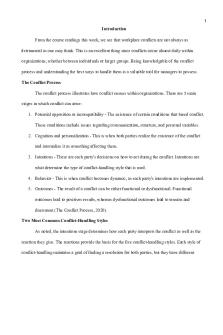BUS 5113 week 1 peer Discussion Assignment. PDF

| Title | BUS 5113 week 1 peer Discussion Assignment. |
|---|---|
| Author | Timothy Iresong |
| Course | Organizational Theory and Behavior |
| Institution | University of the People |
| Pages | 3 |
| File Size | 155.4 KB |
| File Type | |
| Total Views | 170 |
Summary
Question and answer for BUS 5113 week 1, Organization Theory and Behavior discussion assignment submitted for peer discussion forum....
Description
The Phenomenon of Micromanagement Dictionary.com defines a micromanager as a manager who “manages[s] or control[s] with excessive attention to minor details”. The Wikipedia defines it as a business “management style whereby a manager closely observes and/or controls and/or reminds the work of their subordinates or employees”. Merriam-Webster's Online Dictionary defines the micromanager as one who "manage[s] especially with excessive control or attention on details". So, one can define a micromanager as a leader who wants to be in charge and control the production process of an organization. This gives the micromanager a negative image and is described as a killer rather than a leader. Micromanagers may be seen as people who fear to lose control over employees by being obsessed with knowing what staff are doing. They exhibit the “I-know-best approach” to every task. They want to always lead and suspects every employee of wasting time and resources. They may organize frequent meetings (irrelevant to productivity) just to find faults, or attend meetings to put across a point in discussions that do not need his presence; or force employees to attend meetings that may be obviously irrelevant to them. They rarely delegate any task, not even tasks within the capabilities of subordinate employees. Lastly, micromanagers are well known for running “one-man shows”; taking on themselves a greater chunk of the workload. It is not all a dark picture after all! Micromanagers can trade off their killer habits for healthier and more productive leader styles in many ways. By adopting inclusive goal-setting where employees are involved, the manger can emphasize less the need to meeting targets as employees assist in contributing to the larger picture and own what is achieved. Secondly, managers should adopt top-down and bottom-up communication approach to welcome discussions with employees on how they work best and most efficiently allowing for
flexibility and alternative methods performing task. After all, the ultimate is to accomplish the task. It is also believed that cutting ties with the office and creating on-site and off-site work options would give employees freedom to work where they like. This would give employees professional independence and mitigate the temptation to micromanage them. This would also help employees work better when not watched and restricted. Another cure to the ills of micromanagement is to make employee recognition personal. Management should reward but allow employees to redeem their rewards from varieties of options that would make them feel fine such as spa treatment, ticket to sporting events, tourist centres, etc. this would be more personal and more motivating. Finally, managers should focus on “feedback on results” rather that the process. It is more important to have feedback on whether or not expectation was met with respect to a set goal(s). Employees would look at the results and tell whether or not the process they adopted worked to success or failure and the need to adapt or change the process. I have defined, discussed the perceptions about a micromanager and some interventions that can help trade off the “ill habits” of micromanagement. However, one question needs to be asked and answered: In my opinion, the micromanager is essentially concerned with accuracy about the best way to achieving expected outcomes. If this is true, then is it the case that there are no advantages in micromanagement? References Dictionary.com (2008). Definition of micromanage. Haynes, A. (2017, March 8). 7 warning signs you’re the dreaded micromanager. Entrepreneur. https://www.entrepreneur.com/article/289699
https://en.wikipedia.org/wiki/Micromanagement Assessed: 21 June, 2021
https://www.dictionary.com/browse/micromanage (Assessed: 21June 2021) Shuttleworth, M. (2009, October 10). Hawthorne Effect. Explorable. https://explorable.com/hawthorne-effect...
Similar Free PDFs

BUS 5113 - Unit 6 Discussion
- 4 Pages

BUS 5113 - Unit 5 Discussion
- 3 Pages

BUS 5113 Discussion Unit 7
- 3 Pages

BUS-206 Discussion Week 1
- 1 Pages

BUS 102 assignment week #1
- 2 Pages

BUS 5113 Portfolio 2
- 3 Pages

Week 3 discussion assignment
- 4 Pages

Week 7 (BUS) Written Assignment
- 4 Pages
Popular Institutions
- Tinajero National High School - Annex
- Politeknik Caltex Riau
- Yokohama City University
- SGT University
- University of Al-Qadisiyah
- Divine Word College of Vigan
- Techniek College Rotterdam
- Universidade de Santiago
- Universiti Teknologi MARA Cawangan Johor Kampus Pasir Gudang
- Poltekkes Kemenkes Yogyakarta
- Baguio City National High School
- Colegio san marcos
- preparatoria uno
- Centro de Bachillerato Tecnológico Industrial y de Servicios No. 107
- Dalian Maritime University
- Quang Trung Secondary School
- Colegio Tecnológico en Informática
- Corporación Regional de Educación Superior
- Grupo CEDVA
- Dar Al Uloom University
- Centro de Estudios Preuniversitarios de la Universidad Nacional de Ingeniería
- 上智大学
- Aakash International School, Nuna Majara
- San Felipe Neri Catholic School
- Kang Chiao International School - New Taipei City
- Misamis Occidental National High School
- Institución Educativa Escuela Normal Juan Ladrilleros
- Kolehiyo ng Pantukan
- Batanes State College
- Instituto Continental
- Sekolah Menengah Kejuruan Kesehatan Kaltara (Tarakan)
- Colegio de La Inmaculada Concepcion - Cebu







